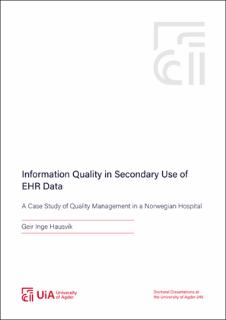| dc.description.abstract | The motivation for undertaking this study relates to my experiences from practice in a public hospital, where I have observed variations in reaching organizational goals of quality management informed by electronic health records (EHR) data. For example, while some departments and units have long-time traditions in meeting the quality goals that are set locally, regionally, or nationally, other departments and units struggle to meet the same quality goals. Thus, generating actionable information by reusing routinely collected EHR data does not necessary lead to action in response to the information. This process of generating information from existing EHR data, and communicating and using such information for organizational purposes, may be challenging in a highly complex environment such as health care organizations. Within this process, information quality (IQ) may influence actors’ perceptions of action possibilities the information offers, thus influencing the actual use of the information required to reach organizational goals.
EHR data can be used for clinical purposes at the point-of-care (i.e., primary use) and reused for purposes that do not involve patient treatment directly (i.e., secondary use). Examples of such secondary use includes quality management, research, and policy development. Though it is widely accepted that IQ influences the use of EHR systems and the information generated by EHR systems, research on the implications of IQ on health care processes is limited: the focus of the current literature is concerned with defining and assessing IQ in primary use of EHR data, whereas the role of IQ in secondary use of EHR data remains unclear. Thus, this dissertation investigates the role of IQ in secondary use of EHR data in an organizational context.
This dissertation addresses this practical and theoretical challenge by focusing on the overall research objective of understanding the role of IQ in secondary use of EHR data. To address this research objective, this dissertation explores the following research questions:
RQ1. How do human actors influence in transformation of IQ while generating, communicating, and using information in secondary use of EHR data?
RQ2. What are the underlying generative mechanisms through which IQ transforms in the process of secondary use of EHR data? | en_US |

